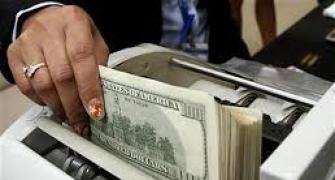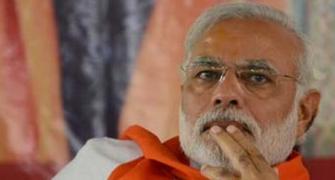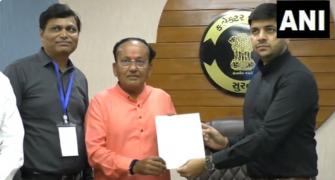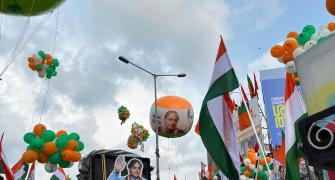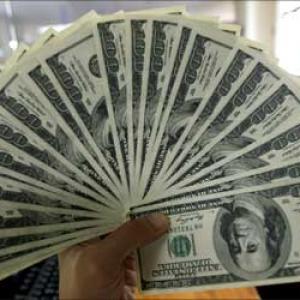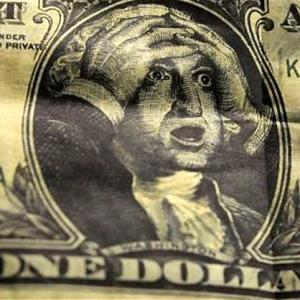Going off cash does not offer a major solution to the problem of black money, notes Subir Roy
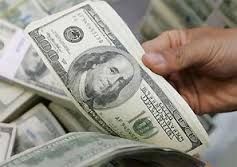 Cashless transactions are one of the very important solutions to tame black money and should be promoted, Prime Minister Narendra Modi has said.
Cashless transactions are one of the very important solutions to tame black money and should be promoted, Prime Minister Narendra Modi has said.
There is a problem of emphasis here.
It is good for people to use as little cash as possible as non-cash (through book transfers in banks) transactions leave a trail that law enforcers like income tax authorities or those tracking money laundering find extremely useful.
But going off cash does not offer a major solution to the problem of black money.
To understand what works best in fighting black money it is critical to understand what black money is and is not.
It is income that is not declared for Income Tax purposes.
This can be simply tax evasion by a businessman or a professional engaged in legitimate activity.
It can also be much more serious criminal offences like handling money that fuels trafficking in drugs or humans.
An enormous amount of black money flows in and out of the banking system and still remains black.
A government official can take his family out for a lavish meal at a five-star hotel or buy the choicest Scotch whisky from liquor shops with cash taken as bribe.
Once these sales enter the books of the hotel chain or the legitimate foreign liquor importer who pay taxes, the black money becomes 'white'.
Then if the hotel chain’s or the liquor importer’s liaison person pays a bribe to any official functionary (there are ingenious ways of cloaking it as a legitimate cashless transaction), the amount paid, which will not be declared by the official as income to the tax authorities, becomes black money again.
Before going any further let us get a red herring out of the way.
During its election campaign the Bharatiya Janata Party (BJP) had promised to bring back black money stashed away by Indians abroad. How this is any more black than black money that stays within the country (there was no similar emphasis on unearthing it) is unclear.
It seems there is greater interest in grandstanding on black money than actually doing something serious about it.
Had the latter been the case the primary reason why black money thrives would have been addressed.
Black money thrives because it plays a critical role in Indian elections and no political party of any consequence appears interested in putting an end to this.
Had it been so the way elections are fought would have changed beyond recognition by now.
It is widely believed that it costs at least Rs 5 crore and often much more to contest a parliamentary seat today, whereas the Election Commission-approved ceiling for such expenditure by a candidate is a mere Rs 70 lakh (Rs 7 million).
What is fascinating is that many candidates, going by their declared expenses, do not even spend up to the permitted ceiling!
The Economist, in a report in May last year, picked up a frequently cited quote of Atal Bihari Vajpayee, saying that 'every legislator starts his career with the lie of the false election return he files'.
Closer to today, the late Gopinath Munde, then deputy leader of the BJP in the Lok Sabha, in 2013 publicly admitted that he had spent Rs 8 crore for his 2009 parliamentary election, and then, on being issued a show cause notice by the Election Commission, denied the statement by saying it was 'rhetoric'.
Thus, how much gets spent in fighting elections is hardly a well-kept state secret.
It is easy to see what such electioneering lets loose.
A person who has spent Rs 5 crore (Rs 50 million) in getting elected will want to recoup that principal, plus inflation plus a reasonable return to create a corpus with which to fight for his re-election.
Thus, in five years he will want to making close to Rs 10 crore (Rs 100 million) in black money or more.
If legislators who rule the country face this kind of compulsion to generate black money for their own political future, how can they be expected to put in place a system that will bring an end to the generation of black money?
It is, therefore, unsurprising that there is a big hole in the rules on permissible election expenses.
While there is a cap on what a candidate can spend for his election, nothing like that exists for political parties.
What is more, donations up to Rs 20,000 are not treated as donations and can be reported without any details.
So all that a party needs to do to account for, say, Rs 1 crore (Rs 10 million), is to claim that it received it in the form of 500 donations of Rs 20,000 each!
Other rules, in this regard, are either of minuscule size and consequence (companies can now officially make political contributions) or routinely flouted (filing returns on expenses within 90 days of an election).
There is no attempt to change the rules where they matter. The entire political class, across parties, is complicit in this.
Image: The image is used for representational purpose only. Photograph: Reuters


